Table of Contents
A Letter from Our Executive Director and President
Dear Friends,
2022 marked an important milestone in our organization’s evolution. For the first time in our history of more than 60 years, the ACLU of New Jersey adopted a strategic framework that doesn’t just outline our priority issues but sets an overarching vision for the organization to guide us through 2026.
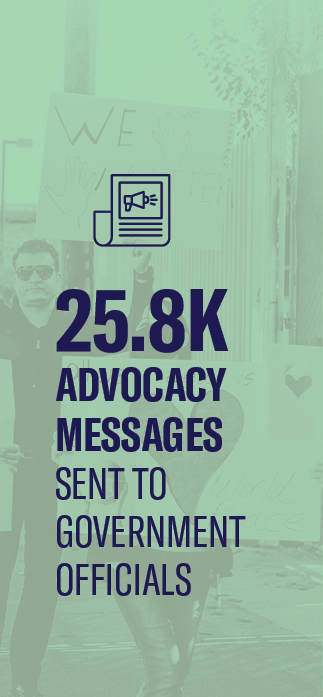
Together with staff, board, and key stakeholders, we identified three strategic priorities that will guide our work over the coming years: racial justice, partnered leadership, and organizational development.
We commit to advancing racial justice, which is at the center of the fight for civil liberties and will advance justice for all historically marginalized communities.
We commit to partnering with and centering the voices and lived experiences of people and groups who historically have been marginalized and disenfranchised, and aim to help equalize the power of all voices across the state.
Finally, we commit to paying continuous attention to our governance and board development, our operational systems, and supporting our staff. We will prioritize caring relationships, equity across identities, and addressing power dynamics within our organizational hierarchy.
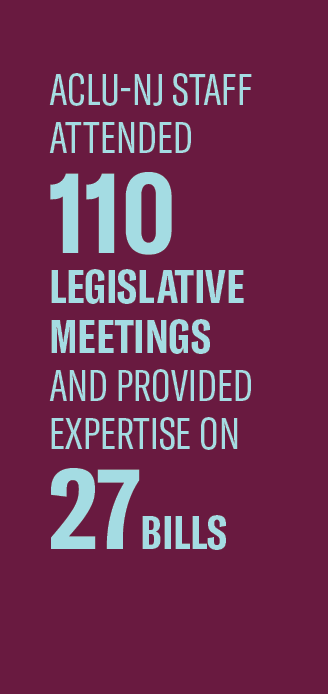
Woven into these priorities are our values: empathy, kindness, humility, and generosity will guide us as we engage in our quest for a just and fair New Jersey.
These values are embedded in the work you will read about in this year’s annual report:
- We made significant strides forward in the treatment of youth in prisons, successfully reducing extreme sentences for children and providing access to special education for students with disabilities.
- We helped build a movement and followed the lead of patients and providers in the pursuit of reproductive freedom, working to expand access to abortion care and support abortion providers during a time of extreme stress and upheaval.
- We called attention to the racial bias perpetuated by government algorithms that result in excessive burdens on already over-policed and under-resourced Black and brown communities.
- And we saw the culmination of more than 20 years of advocacy through the establishment of a licensure program for New Jersey police officers – a crucial step toward police accountability.
Using our strategic framework as our guide, our organization is poised to be even more effective and impactful in striving for a more just and more fair New Jersey. We hope you enjoy reading about our successes in the past year, and look forward to your support as we look toward this exciting vision for our future.
Onward,

Amol Sinha
Executive Director

Marc Beebe
President of the Board of Trustees
Advancing Youth Justice
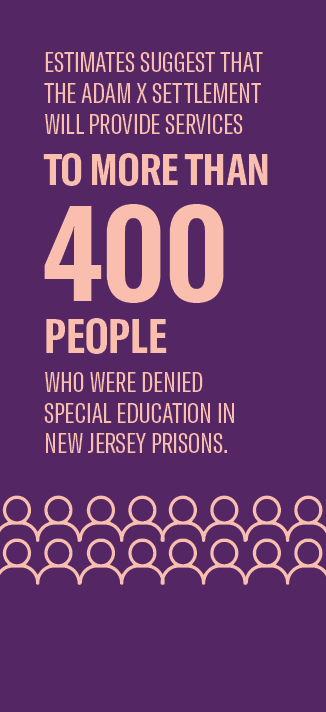
The human and financial costs of mass incarceration are staggering, and the burden falls disproportionately on people of color and low-income people.
ACLU-NJ advocacy has led to New Jersey making significant strides forward in the treatment of people in prisons, jails, and detention centers. But we know there is still more to be done to ensure New Jersey is a national leader in decarceration and improving the treatment of people in prison – and the ACLU-NJ is taking action.
This past year, because of ACLU-NJ litigation, we saw major improvements in the treatment of youth in prisons, providing access to special education for students with disabilities and successfully reducing extreme sentences for children.
State v. Comer
In 2003, James Comer received a sentence of 75 years in prison, with more than 68 years without parole, for his role in four robberies and a felony murder when he was 17 years old. Relying on cases from the United States Supreme Court that prohibited sentences of life without parole for children, the ACLU-NJ filed a motion to correct this illegal sentence on his behalf in 2014.
After two appeals from the ACLU-NJ in response to the sentencing decision, Mr. Comer is now scheduled for release by 2025, and the resulting court opinion has made it possible for nearly 100 young people in New Jersey to petition for early release.
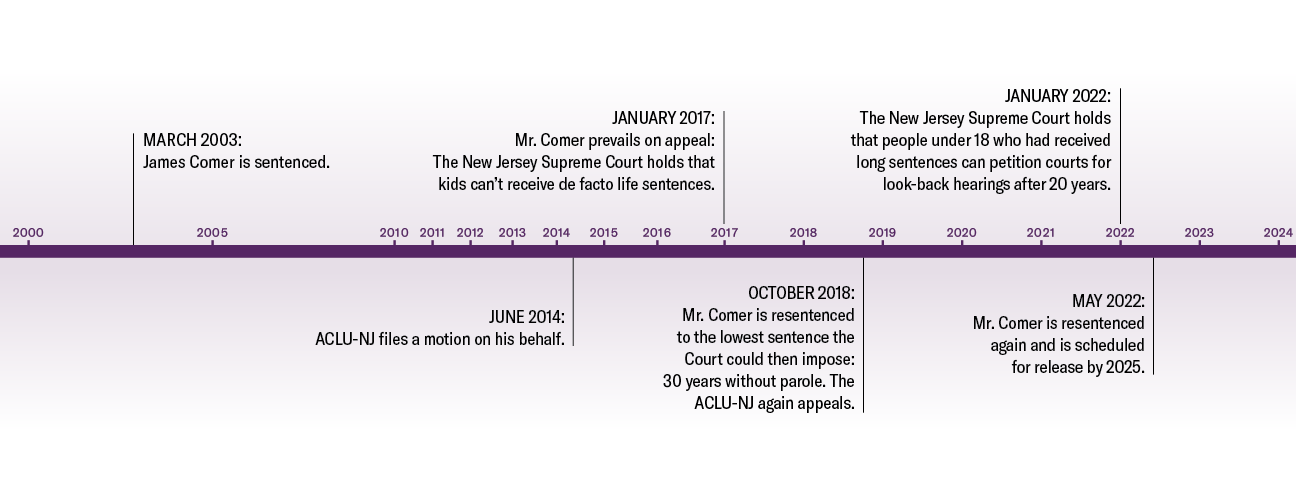
Adam X. et al. v. New Jersey Department of Corrections and Department of Education et al.
Young people with disabilities have a legal right to a free and appropriate public education, even when they are incarcerated. But for years, the educational needs of high school students in New Jersey’s state prisons were not being met.
That’s changing now, with the settlement of Adam X. et al. v. New Jersey Department of Corrections and Department of Education et al., a lawsuit initiated in 2017 by three students – Adam X., Brian Y., and Casey Z. (pseudonyms) – who alleged they were denied special education in prison. Thanks to their calls for change, the students’ legal team, including the ACLU of New Jersey Foundation, Disability Rights Advocates, and Proskauer Rose LLP, spent years investigating and litigating the case, which was certified by the federal District Court for the District of New Jersey as a class action in July 2021.

On March 3, 2022, the District Court granted final approval of a settlement agreement that will usher in new policies to guarantee that students with disabilities in New Jersey prisons receive the special education and related services they are entitled to. The settlement also provides opportunities for make-up services and funds for those who were deprived of special education in prison in the past, and ensures meaningful implementation of the new policies through a five-year monitoring plan. Estimates suggest over 400 people may be impacted by the settlement.
Expanding Access to Abortion
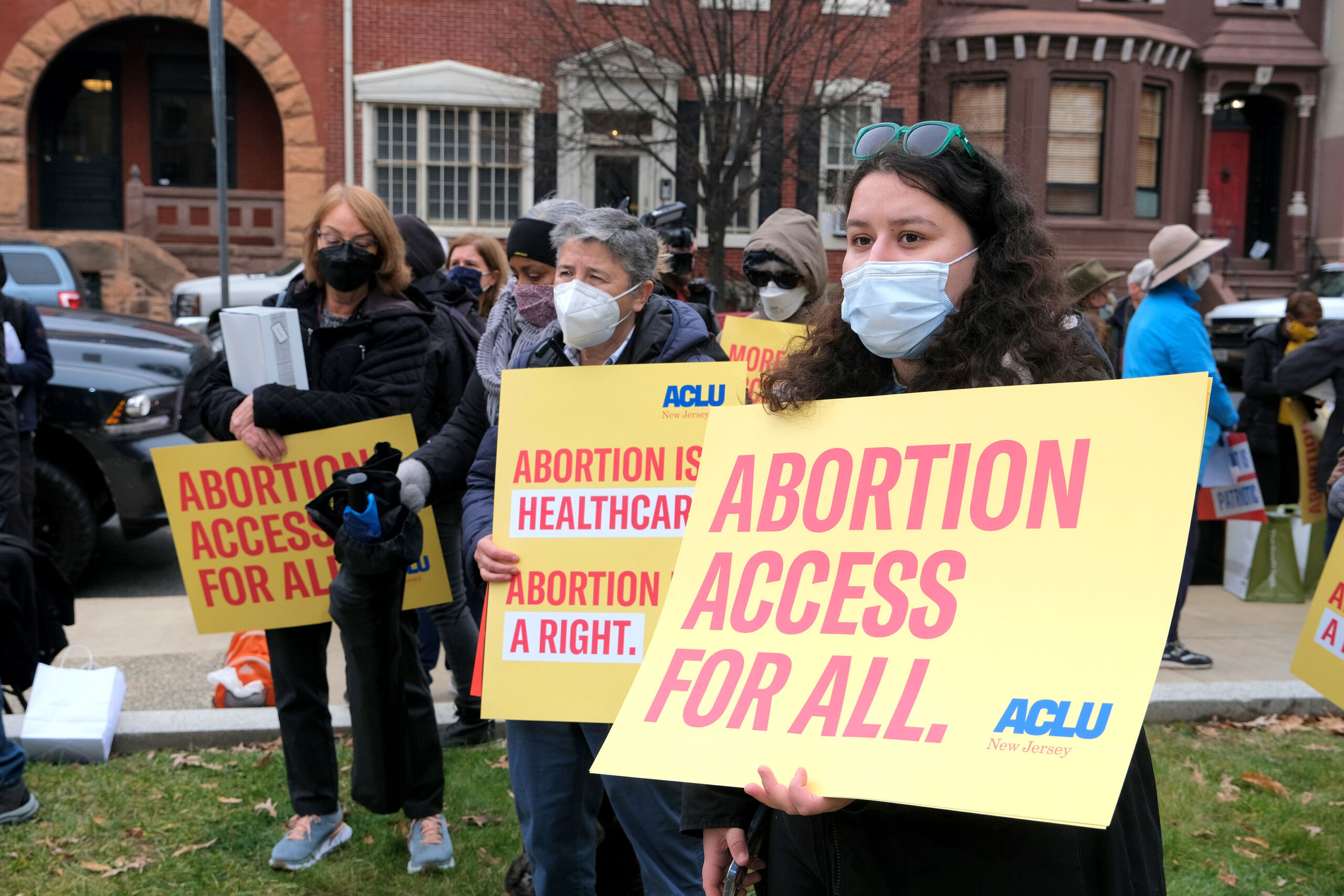
When the U.S. Supreme Court issued its devastating ruling in Dobbs v. Jackson Women’s Health Organization on June 24, which overturned Roe v. Wade, it emboldened anti-abortion politicians across the country to decimate access to abortion and force millions of people to remain pregnant against their will.
In New Jersey, advocates and lawmakers took crucial steps to safeguard abortion rights by passing the Freedom of Reproductive Choice Act in January 2022, but there is much more to do to expand abortion access for all. The ACLU of New Jersey is committed to ensuring reproductive health care, including abortion, is accessible for all New Jerseyans regardless of race, gender identity, sexual orientation, immigration status, income, or insurance, and continues to center the experiences of patients and providers in the fight for reproductive justice, including advocating for the passage of the Reproductive Equity Act.
Supporting Abortion Providers and Patients
After the devastating U.S. Supreme Court decision in Dobbs v. Jackson Women’s Health Organization, a significant number of states enacted laws that severely restrict or ban abortions causing residents of those states to travel to states like New Jersey, where abortion remains legal.
In July, New Jersey enacted laws that enhance protection for individuals who receive, facilitate, or provide legal reproductive health services in the state. The ACLU-NJ and partners worked with the law firm Lowenstein Sandler to launch efforts to support these individuals including developing webinars for providers that will help them take advantage of the protections in the law and mitigate potential legal risks, and establishing a network of pro bono volunteer lawyers who can offer one-on-one legal consultations and advice to callers who have questions about legal reproductive health care in New Jersey.
Provider Spotlight: Dr. Kristyn Brandi
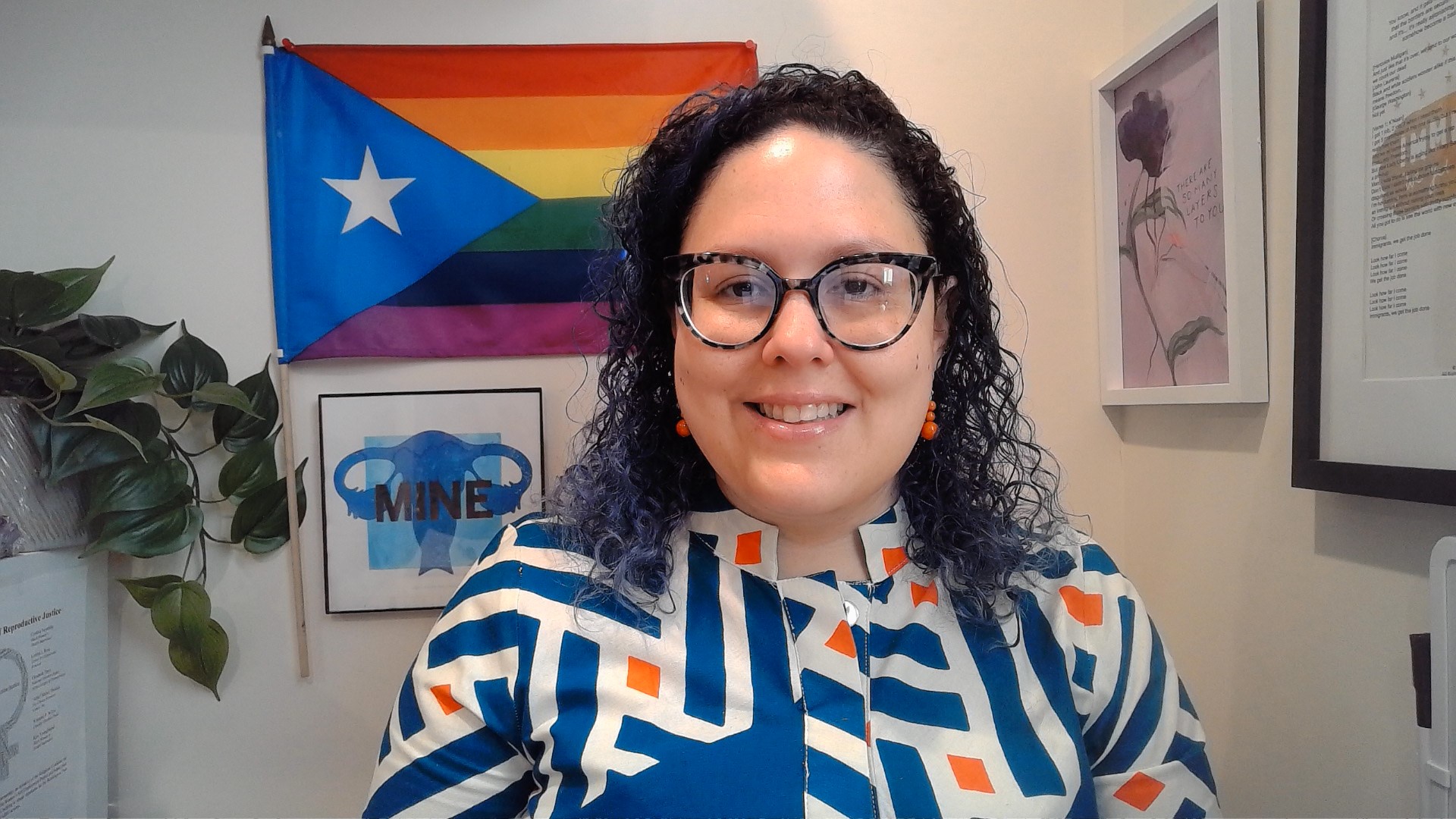
Dr. Kristyn Brandi, a New Jersey OB/GYN, is a voice for reproductive freedom, social justice, and LGBTQIA+ rights, both in New Jersey and around the country. She works in partnership with the ACLU-NJ as a member of the Thrive Coalition, which advocates for access to abortion for all in our state.
Dr. Brandi’s practice encompasses medical care across the spectrum of reproductive health, including abortion care, prenatal care, gynecologic procedures, and outpatient gynecologic care, which, gives her deep knowledge and a nuanced perspective on all aspects of reproductive health and policy.
“I see firsthand how a lack of abortion access shatters lives. I've been in the position of counseling someone, holding their hand, looking them in the eye, and telling them whether or not they can get the care they need. It is heartbreaking in situations where a legal or systemic barrier prevented a patient from getting necessary care. I do this work with the sincere hope that the advocacy we do together and the care we deliver as providers can one day secure a future where no one surrenders their autonomy, their health, or their humanity when they determine the direction of their lives.” – Dr. Kristyn Brandi
Confronting Algorithmic Bias
As technology continues to advance, the government increasingly relies on algorithms and automated decision-making systems to augment or entirely replace human decision makers. From law enforcement, to healthcare, to public benefits and beyond, automated decision-making systems can impose real costs on New Jerseyans. But do these new technologies align with our values and preserve our rights?
Automated systems are prone to arbitrary and biased decision making. Where they are deployed, they can threaten people’s right to due process and subject them to insidious discrimination. The ripple effects of algorithmic injustice can be felt across the state and in nearly every domain – for example, when the amount of healthcare people receive is determined by a computer, when the police choose who to investigate based on facial recognition, or when a person’s eligibility for public benefits is determined by an assessment tool, the people who are subjected to those decisions are forced to bear the brunt of the systems’ errors.
As these technologies are affecting New Jerseyans more and more, the ACLU-NJ launched a new project in August, Automated Injustice, to investigate the use of artificial intelligence, automated decision-making systems, and other sorts of algorithms by the New Jersey government.
Facial Recognition
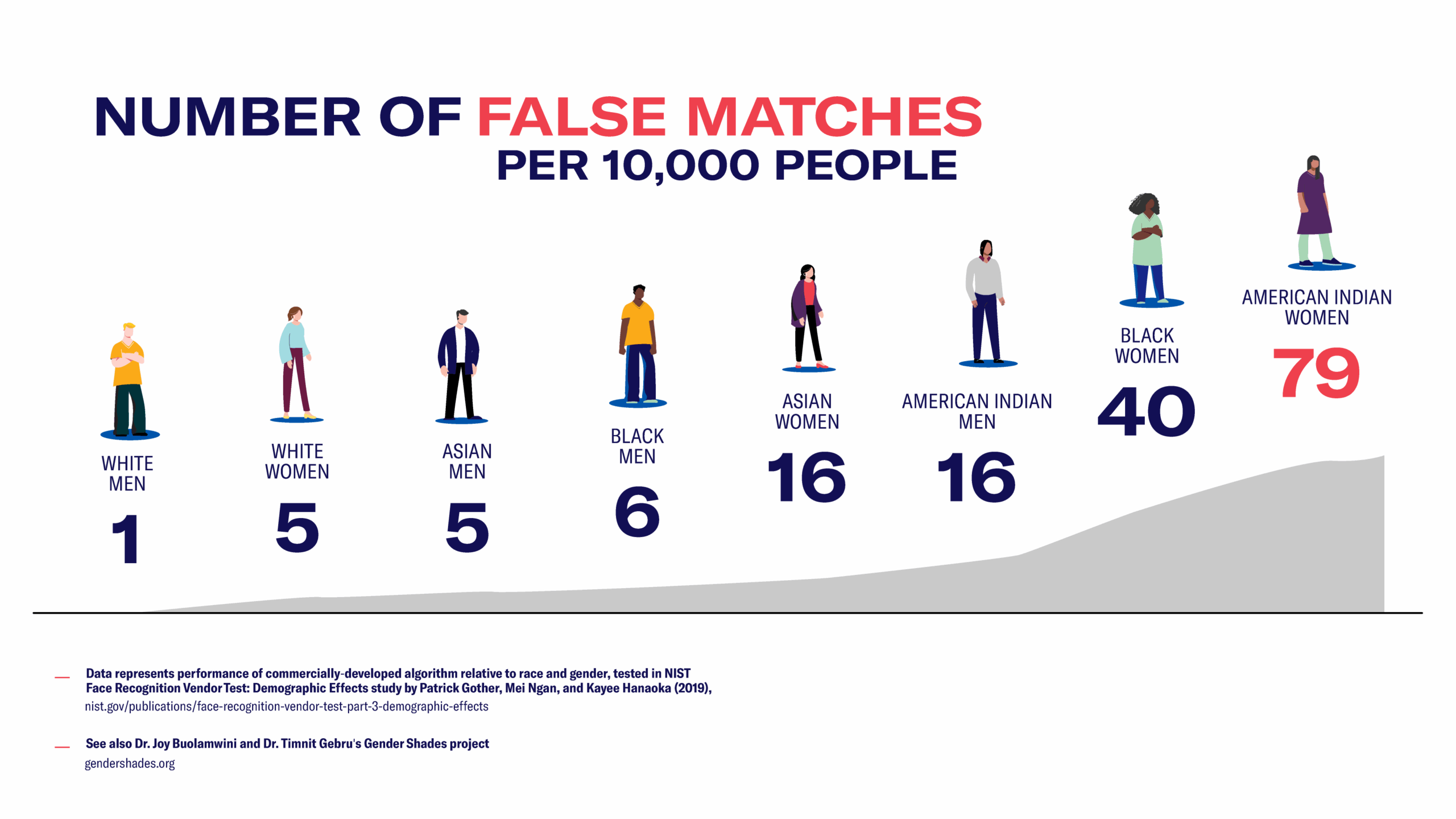
On March 10, the ACLU-NJ and 25 partner organizations provided comments to the New Jersey Office of the Attorney General on law enforcement’s use of facial recognition. Together, the organizations called for a total ban on the use of facial recognition technology by law enforcement. Facial recognition tools jeopardize New Jerseyans’ ability to live safe, private lives free of constant government intrusion and scrutiny, and discourage them from comfortably exercising their constitutional rights to speak freely, associate freely, or enjoy their neighborhoods freely. Facial recognition also poses an exceptionally high burden on over-policed communities of color, particularly in light of its higher rates of inaccuracy for people with darker skin.
A 20-year Fight for Police Licensure
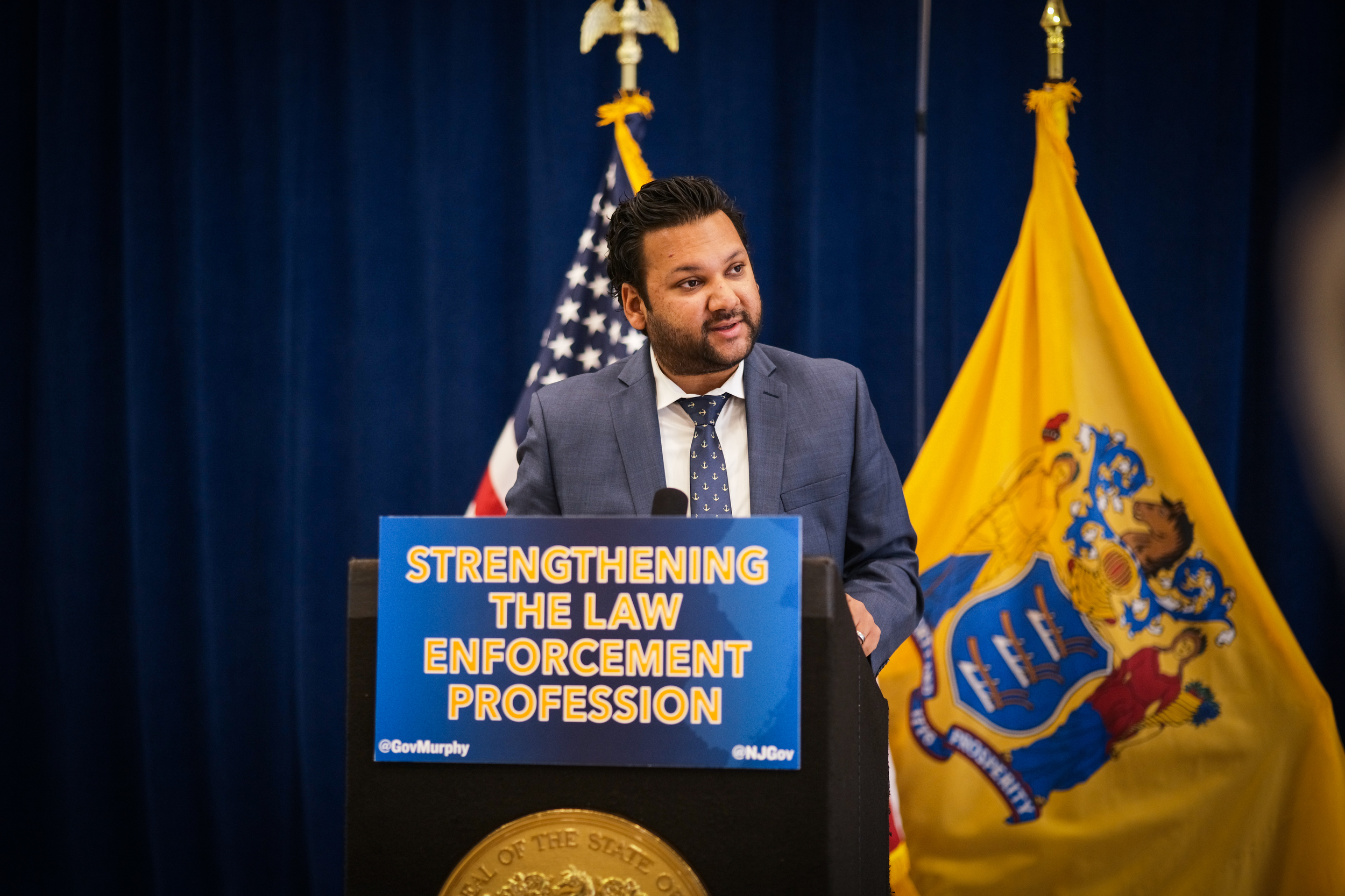
Photo by Edwin J. Torres, NJ Governor's Office
Nearly 20 years ago, the ACLU-NJ led the vanguard of advocates who urged the state to require licenses for all law enforcement officers as one way to stop excessive police power. Ensuring police officers are held accountable for their actions will begin shifting power away from law enforcement and toward the communities they’re meant to serve.
On July 21, New Jersey saw police licensing become reality as Governor Phil Murphy signed A4194/S2742 into law. The bill appropriates $6 million to establish a licensure program requiring that a person holds a valid, active license to be employed as a law enforcement officer in New Jersey. Without licensing in place, officers removed from duty due to misconduct can still be employed by a different police department, making permanently removing dangerous officers from the force nearly impossible.
More to do
This is an important step in increasing transparency and accountability of law enforcement in New Jersey, but there is still much more to be done. The ACLU-NJ continues to call for the passage of a slate of bills that would begin to curb excessive police power and place power with communities, especially communities of color that bear the brunt of law enforcement:
| Shining Light on Secret Police Discipline: S371/A996 The public has almost no way of knowing how — or if — police are disciplined for misconduct. This bill follows many other states to make that information available through the Open Public Records Act. |
| Empowering Communities with Oversight of Police through Civilian Complaint Review Boards: A1515/S2295 This legislation allows communities to set up civilian complaint review boards with subpoena power, the ability to investigate at the same time as internal police investigations, disciplinary authority, and real community representation. |
| The Right to Sue Police for Individual Misconduct: S375/A1006 A legal principle called qualified immunity makes it almost impossible to hold individual officers liable for misconduct in civil lawsuits. These bills would remove one of the roadblocks that make it difficult to hold police accountable for harm. |
| Stopping Lethal Police Tactics: S265/A2431 and A866/S2166 These bills would criminalize police use of chokeholds in New Jersey, and strictly limit use of other deadly force. |
“New Jersey belatedly joins the more than 40 other states in having a licensing scheme for police officers. We must now do the hard work of delivering meaningful measures of accountability such as police discipline transparency, civilian complaint review boards with subpoena power, and ending qualified immunity. We cannot – and should not – aspire to merely catch up with states like Alabama and Florida – instead we must lead on issues of police accountability to create a fairer and more just New Jersey for all.” – Executive Director Amol Sinha
Donor Spotlight: Eli and Jake Rallo

(L-R) Jake, Jack, Eli, mom Kari and dad Victor Rallo, at their family home in New Jersey, Summer 2022. Image courtesy of the Rallo Family.
Eli and Jake Rallo grew up working in their parents’ restaurant in Red Bank, NJ, first bussing tables and later serving guests, quickly learning along the way to prioritize hard work and service. Their family instilled these values in Eli and Jake from a young age through a dedication to public service, and they leaned into these experiences through college. Eli (she/her), age 24, studied music, theatre, and dance at the University of Michigan and got her master’s degree at the Columbia School of Journalism. Jake (he/him), age 22, is a graduate of the Cornell School of Hotel Administration.
“We were born and raised in the hospitality industry – supporting people and serving others is at the core of who we are. We hope we can use this experience to create meaningful change for generations to come.” – Jake Rallo
When Donald Trump took office in 2016, Eli and Jake knew the next four years would be different than anything the country had seen before. And as a woman and a gay man, they felt their identities being threatened in new ways – that’s when they realized they had the opportunity to translate their position of privilege into meaningful change for others.
“Our privilege has given us so many opportunities, and now we hope our work can hold the door open for others.” – Eli Rallo
Determined to learn more about social justice and how they could help, Eli and Jake discovered the ACLU as a source of vital information and an outlet for action. With their passion for all things food and beverage, after spending their formative years working in their parents’ restaurant, they joined forces and founded United Vines, a wine company where proceeds from every Rosé vintage benefit a charitable organization. Proceeds from their second vintage, PRIDE, benefit the ACLU’s LGBTQIA+ work.
Eli and Jake intend to keep supporting as many social justice initiatives as they can – and hope that, one day, they will be pouring wine for the justices of a liberal Supreme Court.
United Vines

Born and bred from a passion for wine and a passion for social justice, United Vines seeks to make every sip of your glass of wine an act of passive resistance.
Eli and Jake Rallo partner with Isabella Oddero, a seventh-generation owner of one of the most historical wineries in the Langhe hills of Italy, to produce a Langhe Rosato (Rosé) vintage each year to benefit charitable partners.
Stay Informed
Sign up to be the first to hear about how to take action.
By completing this form, I agree to receive occasional emails per the terms of the ACLU’s privacy statement.
By completing this form, I agree to receive occasional emails per the terms of the ACLU’s privacy statement.
